| Srl | Item |
| 1 |
ID:
113553
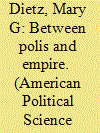

|
|
|
|
|
| Publication |
2012.
|
| Summary/Abstract |
Aristotle lived during a period of unprecedented imperial expansionism initiated by the kings of Macedon, but most contemporary political theorists confine his political theorizing to the classical Greek city-state. For many, Aristotle's thought exhibits a parochial Hellenocentric "binary logic" that privileges Greeks over non-Greeks and betrays a xenophobic suspicion of aliens and foreigners. In response to these standard "polis-centric" views, I conjure a different perceptual field-"between polis and empire"-within which to interpret Aristotle's Politics. Both theorist and text appear deeply attentive to making present immediate things "coming to be and passing away" in the Hellenic world. Moreover, "between polis and empire," we can see the Politics actually disturbing various hegemonic Greek binary oppositions (Greek/barbarian; citizen/alien; center/periphery), not reinforcing them. Understanding the Politics within the context of the transience of the polis invites a new way of reading Aristotle while at the same time providing new possibilities for theorizing problems of postnational citizenship, transnational politics, and empire.
|
|
|
|
|
|
|
|
|
|
|
|
|
|
|
|
| 2 |
ID:
113340


|
|
|
| 3 |
ID:
112865


|
|
|
|
|
| Publication |
2012.
|
| Summary/Abstract |
The meaning of Asia has changed drastically during the millennia the concept has been in use. Its usage was established in Greek literature 2,500 years ago as a geographic reference to lands inhabited by the Greeks at the Eastern side of the Aegean Sea. Over the ensuing centuries, Asia's Western boundary was extended to the rivers Don in the North and Nile in the South. At that time, it hardly contained any definite political or civilisational meanings. These were added to the concept in 1730 in a kind of Swedish-Russian cooperation when the Urals were redefined to form the boundary between Europe and Asia, the former starting to represent progress, and the latter its opposite. This situation has been gradually changing after World War II, when first definitions made in the United States, and later in East Asian countries have devalued the position of Europe and elevated that of Asia. Today, Asia is not a geographical concept. It is a political commonplace, used as a strong and positively loaded linguistic asset in political rhetoric in the Asian Pacific area for various kinds of regional integrative purposes.
|
|
|
|
|
|
|
|
|
|
|
|
|
|
|
|
| 4 |
ID:
108305


|
|
|
|
|
| Publication |
2011.
|
| Summary/Abstract |
The Greek Orthodox Church in Palestine, the largest of the Christian denominations, had long been troubled by a conflict ("controversy") between its all-Greek hierarchy and its Arab laity hinging on Arab demands for a larger role in church affairs. At the beginning of the Mandate, community leaders, reacting to British official and Greek ecclesiastical cooperation with Zionism, formally established an Arab Orthodox movement based on the structures and rhetoric of the Palestinian nationalist movement, effectively fusing the two causes. The movement received widespread (though not total) community support, but by the mid-1940s was largely overtaken by events and did not survive the 1948 war. The controversy, however, continues to negatively impact the community to this day.
|
|
|
|
|
|
|
|
|
|
|
|
|
|
|
|
| 5 |
ID:
124962
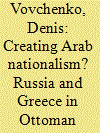

|
|
|
|
|
| Publication |
2013.
|
| Summary/Abstract |
The article discusses Russian and Greek rivalry over the influence in the Patriarchates of Jerusalem and Antioch from the end of the Egyptian occupation to the Young Turk Revolution. While Greece ultimately aimed at including Orthodox Arabs in a Pan-Hellenic nation, Russian private and state actors were motivated by the cultural and political commitment to the defence of Orthodoxy from western inroads. Throughout this period, Russian diplomats were able to continue their traditional partnership with many Ottoman Greek prelates even after the Bulgarian schism of 1872. But when their leadership seemed to be the cause of mass defections from orthodoxy, Russian foreign policy makers from local consuls to the tsar were drawn into supporting the restoration of native Arab control. The article brings fresh archival evidence to put into context the development of some of the earliest modern Arab autonomous institutions. It also contributes to the discussion of the strength of dynastic and religious identities before 1914.
|
|
|
|
|
|
|
|
|
|
|
|
|
|
|
|
| 6 |
ID:
127043


|
|
|
| 7 |
ID:
105539
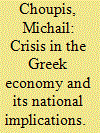

|
|
|
| 8 |
ID:
058941
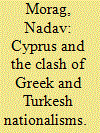

|
|
|
| 9 |
ID:
102958


|
|
|
|
|
| Publication |
2011.
|
| Summary/Abstract |
This article examines the tensions that arose within transatlantic relations when Greece, a NATO member state, began to violate its citizens' human rights and civil liberties following a military coup in 1967. It considers and analyses NATO's subsequent reluctance to put effective pressure on the Greek regime, despite the fact that all member-states, barring Portugal, were united in their revulsion for it. It looks at how allies ended up at odds on how best to deal with such a dictatorship. It scrutinises the tactics employed by Manlio Brosio and Joseph Luns, Secretaries-General of NATO, to ensure that conflict within the Alliance over the Greek issue was contained and that Cold War priorities retained precedence. Finally, it evaluates the long-term ramifications of the Greek case on transatlantic relations.
|
|
|
|
|
|
|
|
|
|
|
|
|
|
|
|
| 10 |
ID:
113337


|
|
|
| 11 |
ID:
103806
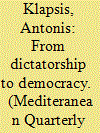

|
|
|
|
|
| Publication |
2011.
|
| Summary/Abstract |
The essay examines the way US-Greek relations evolved during the first critical year after the collapse of the seven-year military dictatorship in Greece. It is argued that the new prime minister of Greece, Konstantinos Karamanlis, wished to promote cooperation between Athens and Washington but on condition that this cooperation would be equally beneficial for Greece and the United States. That the Americans did not seem prepared to undertake any serious initiative to promote a solution of the Cyprus question or to relieve Ankara's pressures on Athens in the Aegean Sea made relations more complicated.
|
|
|
|
|
|
|
|
|
|
|
|
|
|
|
|
| 12 |
ID:
120010
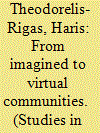

|
|
|
|
|
| Publication |
2013.
|
| Summary/Abstract |
The pivotal role played by Computer-Mediated Communications (CMCs) as mobilization tools for social movements as diverse as the 'Arab Spring', the Iranian 'Green Revolution', and the 2008 Greek 'December Riots', has rekindled academic interest in the internet as a field of sociological research. Drawing on new media and nationalism studies, this article approaches a particular type of CMC as a 'virtual community'. By examining the context of post-1999 Greek-Turkish reconciliation, it is argued that these virtual communities have offered significant breathing space for individuals who are ready to revisit, discuss, and negotiate the constitutive boundaries of modernity's 'imagined communities', and are therefore conducive to the Greek-Turkish rapprochement.
|
|
|
|
|
|
|
|
|
|
|
|
|
|
|
|
| 13 |
ID:
066878
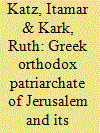

|
|
|
| 14 |
ID:
115471
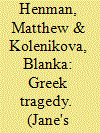

|
|
|
| 15 |
ID:
106102


|
|
|
| 16 |
ID:
085310
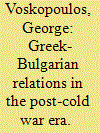

|
|
|
|
|
| Publication |
2008.
|
| Summary/Abstract |
The Balkan Peninsula has been an unstable regional security subsystem because of a number of defining and qualitative parameters, namely, overt or covert challenges to the territorial status, interethnic conflicts, the "great idea" syndrome, out-of-system interference, and minority expansionism. In the post-Cold War era, European Union enlargement in the area assisted the establishment of a core of systemic stabilizers that could, under certain conditions, absorb inherent instability. Greece and Bulgaria constitute an axis providing eufunctional input to the regional stability and security equation. Their partnership has been an example of inter-Balkan cooperation and an effort to establish an equilibrium mechanism to enhance the cohesion of the region
|
|
|
|
|
|
|
|
|
|
|
|
|
|
|
|
| 17 |
ID:
076073
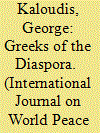

|
|
|
| 18 |
ID:
082076


|
|
|
|
|
| Publication |
2008.
|
| Summary/Abstract |
Ziya Öni? and ?uhnaz Yilmaz discuss the nature of the current Turkish-Greek rapprochement. They conclude that while the relations have improved, in order to reach a durable partnership and to move beyond the existing stalemate, a more proactive approach from both sides on core issues of conflict is necessary
|
|
|
|
|
|
|
|
|
|
|
|
|
|
|
|
| 19 |
ID:
103805
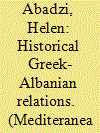

|
|
|
|
|
| Publication |
2011.
|
| Summary/Abstract |
Since the nineteenth century, Greece and Albania have been separate countries, but for about twenty-two centuries they belonged to the same state in its various forms. The ancient Greeks and Illyrians were Indo-European tribes who intermarried with pre-Hellenic populations after arriving in the Balkans about four thousand years ago. Multiple migration events occurred to and from one another's lands; in ancient years Greek cities like Corinth established colonies on the Illyrian coast, while in the Middle Ages Albanian speakers (known as Arvanites) migrated across Greece. Hundreds of years later, another five hundred thousand Albanian speakers had immigrated to Greece after 1985. The data show that Greeks and Albanians have a long-term kinship, but this is obscured by linguistic and religious differences. Understanding this common past may strengthen contemporary political relationships.
|
|
|
|
|
|
|
|
|
|
|
|
|
|
|
|
| 20 |
ID:
051435
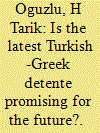

|
|
|